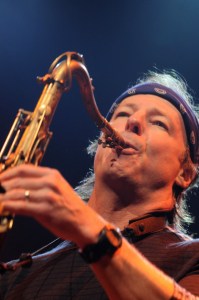– Advertisement –
HIT CHANNEL EXCLUSIVE INTERVIEW: February 2024. We had the great honour to talk with a legendary saxophonist: Bill Evans. He is best known as a member of Miles Davis’ band from 1981 to 1983, releasing with him albums such as “The Man With the Horn” (1981) and “We Want Miles” (1982). He has also played with Elements, Mahavishnu Orchestra, Gregg Allman, Warren Haynes , Phil Lesh, Willie Nelson, Herbie Hancock, Mick Jagger and others. This spring, he is going to release his new solo album “Who I Am”. Bill Evans and the Vansband Allstars will play two shows at Athina Live in Athens on 11 May. Read below the very interesting things he told us:
What’s the basic idea behind “Who I Am” album?
– Advertisement –
The basic idea behind “Who I Am” is to play harmonies that match my emotions, with musicians who are able to perform at the highest level the thoughts and musical notes that I write and record. So, what I did was: I sat down for two months and I tried to write the kind of melodies, harmonies and emotions that were truly what I am feeling. I wanted to make sure I felt something from the music, not just notes; it’s not just an exercise, I want these to be melodies and harmonies that you could remember, that you could feel and that was strong. This record is one of my favourites because I was able to accomplish that on these songs. I am really excited about it.
Could you give us some general information about the writing and recording process of “Who I Am” album?
Yes, I started recording at home and I used a piano first, and then I started putting down different drum tracks and samples, so, as I was writing the song I could hear the rhythm section. I worked on probably 20 or 30 songs all at the same time and the songs that end up being the strongest are the ones that I continue to finish. I keep an idea in mind: I want this album to be a very cohesive melodic record, so I really tried to keep it in that mode, so that everything felt that it belonged on the same record. I just wanted to get into the melodies that are natural to me, after doing so many records. So, the process is: I start with the piano, then I work with the computer, drums and bass tracks and stuff like that; I play everything. Then, once I have a demo of the song, I can play it for the other musicians and let them do their thing on my music. I never tell the musicians exactly what to play, because when you get musicians at such a high level like this, like Keith Carlock (ed: Steely Dan, James Taylor -drums), Wolfgang Haffner (drums), Victor Wooten (ed: Béla Fleck and the Flecktones, Mike Stern -bass) and Simon Oslender (piano, organ), they know what to play. They are such individuals, that I want them to be able to play themselves on my music. That’s the process.
– Advertisement –
Ron Carter (Miles Davis Quintet –bass) told me: “The first take is always the best in the studio because the first time you play the music, the second time you play yourself”. Do you agree with this?
It depends on the kind of music. If it’s straight ahead jazz, many times it’s the first take, but many times it’s the second or the third take, the more familiar you become with the music. The first take only happens once and many times that can be a magical moment, but I don’t necessarily believe that is the first take of every song that you ever record, because many times after the musicians have worn the song, they can play it better in the third or the fourth take, because they are more familiar with it. So, for me, sometimes it’s the first take, but not all the time.
Do you have trouble coming up with titles for instrumental pieces?
– Advertisement –
Yes (laughs) ! Yeah, instrumental pieces are different. You wanna be able to come up with a title that somehow it sounds like it could be related to the music, but most of the times when I write songs and I am gonna record them their titles are: “1”, “2”, “3”, “4”, “5”, “6” (laughs) and after the tune is done, then I would come up with a title. But, yeah, for instrumental tunes is never easy to come up with a title. It’s a good question.
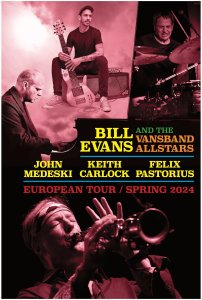 The Vansband Allstars will join you on your upcoming tour. Please tell us a few words about playing with Keith Carlock (drums) John Medeski (keyboards) and Felix Pastorius (bass)?
The Vansband Allstars will join you on your upcoming tour. Please tell us a few words about playing with Keith Carlock (drums) John Medeski (keyboards) and Felix Pastorius (bass)?
Ok. These are musicians that play their instrument at the highest level. They can play all kinds of music and they are extremely expressive. So, when I give them a song to play, the song is a launch pad for wherever the song is going to go. I mean, Keith Carlock, Felix Pastorius and John Medeski have been the most in demand players in the world for quite some time. John Medeski has never played with Keith Carlock and he has wanted to play with Keith Carlock for a long time and I believe their styles are gonna be amazing together. I play with John on and off for many years and just recently, in the last two years, I’ve been playing a lot with Felix Pastorius, who is a phenomenal bass player and I feel that he is taking the bass on step further than his father did. I mean, he is able to play things on the bass that I don’t think anyone can. So, this kind of music that I’m playing now is a great stimulus for them to play the music great and also do what they do great. This music, after we play melody, after we play song, it’s gonna go anywhere. I wanna give the musicians the freedom to create a really high energy every night, so that every night is a special concert for the people that are listening. John Medeski is one of the most creative keyboard players I have ever played with, he is always open to whatever. He is also gonna be playing a small melodica and sometimes I will sit on the keyboard and back him up. There are a lot of different possibilities with this group. I think it’s gonna be very exciting.
How much different will be the dynamics in the band considering the fact that there is no guitar player in this touring line up?
The dynamics are gonna be strong because John Medeski has so many different sounds. I ‘ve played with guitar players for many-many years and it’s a great change for me to do tours without a guitar player, because when I play with a keyboard player, I play a little differently, which is normal. I play a certain way with guitar and I play a certain way with keyboard and with this particular group it is gonna be actually easier to hear the saxophone. Sometimes, guitar players tend to play very loud and they can cover up the saxophone at different times. For me, I am excited dynamically to play with this group. I mean, we can go anywhere with this group as the songs that we are gonna be playing have built-in dynamics, because that’s just the nature of the songs. It’s gonna be very exciting because everybody in this band is a creator, everyone in this band is an improviser, so it’s a very special band. We are getting a lot of excitement from people that are contacting all of us through our website, saying they are very excited to see this particular band. It seems that tickets are selling a lot even this early. That’s nice.
You will play two shows in Athens on 11 May. What should fans expect from these shows?
A lot of energy, a lot of new music and they are gonna be able to hear these players playing things in a very fresh way. They are gonna be able to hear: Keith Carlock, he is one of the best drummers in the world. So, they are gonna hear one of the best drummers. Felix Pastorius is one of the best bass players. So, they are gonna hear one of the best bass players. John Medeski is completely original, he is one of the best organ and keyboard players. So, all of us together, they are gonna get a very high level show with melody that they can also remember. It’s not just jazz. This is jazz with melodic content and music that the audience can relate to. So, after we play melody, after we play song, the improvisation is at the highest level. We are always aware of an audience. I think the audience they are gonna be very excited with the show.
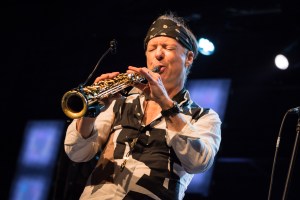 Did you have fun playing at the Warren Haynes’ Christmas Jam last December (2023)?
Did you have fun playing at the Warren Haynes’ Christmas Jam last December (2023)?
Yeah, I had a great time! I hadn’t played with Warren Haynes probably in 7 years, this is the first time that we played. We used to play together all the time and we went to different directions in the last 7 years and then there was the pandemic and stuff. Yeah, it’s always fun and interesting because that music is different from the music that I do with my groups. The music with Warren Haynes is more jam band rock, so that’s how I perform with him. Slash was playing guitar. There were great musicians. John Medeski was over there. The singer named Datrian (ed: Johnson), he’s from Asheville, North Carolina, a young phenomenal singer that I think the world should actually get to know him, at some point. So, there are all these different musicians and people to play with. That was a Warren Haynes concert and there are always like 15.000 people to come to the show, so it’s very energetic and very rock ‘n’ roll.
How did you come up with the idea to make the “Soulgrass” album in 2005?
Well, I was very much influenced by Americana music. I love the instruments of banjo, mandolin, dobro, the Americana instruments because I think they sound really good with the saxophone and no one has really done that. It was something that was exciting to me. So, I started writing music like that and also if you listen to bluegrass music, it sounds very much like bebop jazz, so it ‘s got a lot of similarities and I love playing with a violin player who can really play. That idea was very natural to me and I was excited to do it and I had that band together for almost 12 years and it was a lot of fun. I live in Nashville now and I am going to be putting together a better band that has those instruments, probably next year.
Could you describe to us your feelings touring all over Russia in 2015 while making the “Groove” (2017) documentary?
What I found is people are the same all of the world. For me, it’s a shame that you have politicians that are different than the normal, regular people. The normal, regular people in Russia are very nice, they are just trying to provide for their families and then you have this regime that is a dictatorial, authoritarian government that just keeps the people down. So, I was there from Siberia all the way to Moscow and I met some great people because the people of Russia are warm, hardworking and they are nice people. There is a big difference between the politicians in Russia and the people. That’s what I noticed. So, playing music was great because people all over the world love music. It really is the international language. It’s a real shame what is going on now because I don’t think as US musicians will be going to Russia again any time soon.
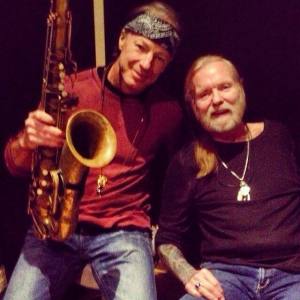 One of my favourite Youtube videos is you playing “In Memory of Elizabeth Reed” with The Allman Brothers Band at the Beacon Theatre in 2010. Did you enjoy that performance?
One of my favourite Youtube videos is you playing “In Memory of Elizabeth Reed” with The Allman Brothers Band at the Beacon Theatre in 2010. Did you enjoy that performance?
Yeah. I played with The Allman Brothers a lot. They were all friends of mine, and I would sit in with them a lot when they would be in New York. It was always a high energy, a lot of fun and a great feeling with that band. I will be doing a concert in Sarasota, Florida in about one month with some of the members that used to play with The Allman Brothers, I will be a guest for their band for one night. I do enjoy playing that music. It’s fun, it’s different and I always play a little bit differently when I am with those groups.
How did it happen to record “Love is Working Overtime” with Gregg Allman on your “Rise Above” (2016) album?
It was really special because I ‘ve always loved the way Gregg had sung the blues. We became really good friends and I told him that I wanted to have him on my record; I would love to write a song for him that he could sing. So, he said: “Well, send it over to me”. So, I wrote a song and I sent it to him and he wrote back to me saying that this song was so inspiring that he can’t wait to record it and he really believed that it would gonna come out great. I went down to Savannah, Georgia where he lived and we recorded it and it was really special because Gregg was a special singer and an original American rock ‘n’ roll star, I would say more of a soul/country star. It was so much fun because it was so natural, he was such present, he loved singing it and he loved the way the tune came out and I was so excited about that. So, for me, it was a really special moment.
How important is improvisation to you?
Well, it’s everything because improvisation is personal, it’s the way somebody performs their own style, it’s the differences between each different player. I mean, you spend a whole lifetime learning how to play jazz. It takes a long time to get really good at and you have to keep practicing and doing it in order to keep it at the highest level, but that’s what we love to do. Because if it were easy, everybody would do it, but for me that what improvisation in jazz is. I am a jazz musician first; if you can improvise and you can play jazz, you can pretty much play any kind of music because jazz is a language. It’s something that you learn, just like any foreign language that you speak. It’s like we are speaking to our instrument and the more we play it and the more with perform it, the better we get at it. It’s basically what separates each musician as an individual.
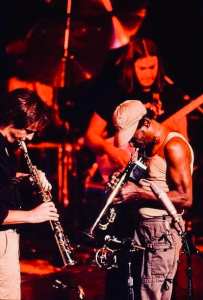 One of your signature tracks with Miles Davis is “Jean-Pierre”. What’s the story behind this great song?
One of your signature tracks with Miles Davis is “Jean-Pierre”. What’s the story behind this great song?
The story behind that song is that I heard him playing one morning at his place of residence in New York on West 77th Street, back in 1980. It was a cool little song and he said: “What do you think?” and I said: “It’s a great little song”. At our first concert, which was in Boston we needed more music and I told him: “Let’s play that little song” in the first set and he said: “No, that’s a tune I don’t want to play it”. So, we didn’t and then in the second set, if I am correct, we didn’t have any more music and I went to him and said: “Well, I don’t know what you have in mind, but I think you ‘d better play that little melody now, so that we have something to play” and he said: “Alright, let’s give it a try”. So, we got Marcus (ed: Miller –bass) playing the bass line, he played that melody and the rest is history. I sort of feel a little bit responsible for that song, because he wasn’t interested in playing that little melody and I kept telling him that we should. So, if I had told him in the beginning that we shouldn’t do it, he probably would never have done it. So, that’s the story.
When you were in Miles’ band you played some keyboards on stage. How did it come about?
I used to play piano at his house, I used to play for him and he said: “I want you to play on stage as well”. He just wanted me to play electric piano sometimes, which was a Fender Rhodes and that’s pretty much how it happened. I used to play at his house and then he said: “I want you to do it in some of the concerts”. I said: “Ok” and that was it.
Was Miles an easy-going person to work with?
That’s a big question. He really was pretty easy to work with because I knew him very well. So, he would just let you play. He figured that you already know how to play by the time you get into his band. We were very close friends, so for me, you just keep your eye on him, you watch him all the time because he can start things to happen. That’s pretty much how that was.
Why did you decide to leave Miles Davis in 1983?
Because John McLaughlin asked me to join his group (ed: Mahavishnu Orchestra) and I wanted to play some different music, so I was happy to move on. It’s the same as in any band, whether it’s Miles or John McLaughlin or whoever. After you play music for a while, you want to have some other experiences. I mean, over the years I’ve done my Push band, my acoustic group band, I had Soulgrass, Vansband, because it’s just natural that you want to play different kinds of music with different players. After a few years, sometimes a little bit longer, it’s just natural to do different things. So, after I was with Miles for a while and I got the opportunity to play different music, it felt natural.
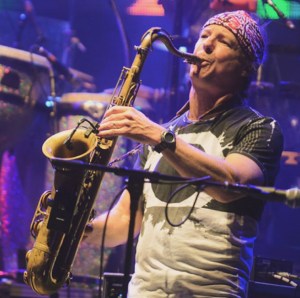 How much artistic freedom do you have on other people’s records?
How much artistic freedom do you have on other people’s records?
Well, that depends. When people ask me to play on other people’s records they pretty much want me to play my style. They are getting me because they want me to do what I do. So, I almost always have artistic freedom. I try to play the music that they send, to the best of my ability but when it comes to improvising, I do what I want to do, because that’s why they are calling me. They want me to do what I do best, which is myself. I feel that’s why they are contacting me, so that’s why I do that.
You wrote “Clarendon Hills” on Mahavishnu Orchestra’s “Mahavishnu” (1984). Is this a kind of tribute to your childhood years (he was born in Clarendon Hills village in Illinois)?
Yes. I thought of it and I wrote a song and then we recorded it with John McLaughlin. Yeah, you are right. Absolutely.
Do you remember your Athens show in 2016?
Yeah, I do remember playing in Athens. I ‘ll play in different place this time, right? I think so (ed: in 2016 he played at Gazarte –now he’ll play at Athina Live). It was fun. That was a really cool venue to play and it was the first time I went to Greece. So, we had a couple of days out and we were able to walk about and see different things. So, it was a lot of fun and I do remember that venue. It was a very cool venue to play and people were very nice. We had a great time.
Please tell us about the influence of Dave Liebman (Elvin Jones, Miles Davis -saxophone) on you.
Well, when I coming up I was listening to John Coltrane, Sonny Rollins and Joe Henderson. I started listening to the post-Coltrane saxophone players, the people that I could go and see live. And I could go to Steve Grossman, I could go to Dave Liebman, I could go to Michael Brecker and I could see this young saxophonist’s (ed: Dave Liebman’s) cool playing with Elvin Jones (drums) and I could go and see live. So, Dave influenced me because I used to go and see his band. Sometimes, he would play drums and I would play saxophone, so I got to know Dave. Dave was an influence on me, he recommended me to Miles Davis’ group, so that was the big, really great thing for me. I will always be thankful to Dave for that.
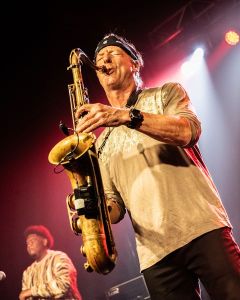 Miroslav Vitous (Weather Report, solo) told me that jazz is dead, jazz is finished because there aren’t great musical personalities like Wayne Shorter and Herbie Hancock anymore. Do you agree with this?
Miroslav Vitous (Weather Report, solo) told me that jazz is dead, jazz is finished because there aren’t great musical personalities like Wayne Shorter and Herbie Hancock anymore. Do you agree with this?
No, I don’t agree with that because now there are so many great players, they just don’t have places to play. There are now so many possibilities to learn, you have so many great young players coming out of schools every single year, but they don’t have the opportunity. There is so much recording that are coming out, I mean, it’s everybody at a home studio, everybody is working and everybody is recording. Before, when Weather Report put out a record, there was no Spotify, there was no downloading, there was no streaming; if you wanted to hear Weather Report, you had to buy the record. So, everybody was aware. There wasn’t so much music coming out, so everybody was listening to the bands that were doing a record. Now, there are no things like that. On the other hand, there are lots of great musicians that there are out there now, they just don’t have a place to play because they don’t have names and in order to go out and play, promoters want to sell tickets. They would hire a band that has a name that people would know and recognise, so they can sell tickets. So, I think it’s very difficult for young musicians now, because they can to listen to everybody, they can learn how to play, but they don’t have a place to play. It’s a difficult time for young musicians in United States, I feel.
Why are you so against smooth jazz?
I am not against any kind of music. The one critical thing that I want to say about smooth jazz is there is no individuality, there is nothing unique. Most of the songs sound the same. What smooth jazz is, is sort of instrumental R ‘n’ B music and they want it to keep it simple, not challenging and most of the saxophone players in smooth jazz all sound the same, they play the same line. There are no individuals. If you hear an alto player playing smooth jazz, you don’t know who he is, he could be anybody. But in jazz, you could hear Wayne Shorter playing one note, you know it’s Wayne Shorter or sometimes people tell me they hear me playing one line on soprano and they know it’s me. If you hear somebody in smooth jazz playing a solo, their solos all sound the same, because it’s very much a set format. That’s not what I am in music for. I ‘m in music to be an individual, to play my music, to connect with an audience who will recognise it’s my own. Smooth jazz doesn’t do that. Smooth jazz is just a certain kind of music that isn’t so difficult to play and it doesn’t contain any individuality. That’s my critical explanation to that.
Is it flattering that you ‘ve been recognized by the whole jam scene?
That’s an interesting question because in jam scene they don’t really understand jazz. The problem with the jam scene is: There are some really cool bands that play some very-very cool songs, but none of them can really improvise. So, they would play 5 minutes of a cool song and then they try to become jazz musicians for the next 15 minutes and they don’t sound like very good jazz musicians, if that makes sense. The jamming in the jam bands is not at a very high level and the kids and the people that are coming to hear the music are not coming there to hear musicians playing at a high level. They are coming there just to have a good time. So, whether you get me to play saxophone on a jam band song or you get somebody that can barely play the saxophone, the audience has no idea. So, that was sort of depressing to me after playing in the jam band scene for a while and I was sitting in and playing with many of the most popular jam bands, to realise that what I was playing really didn’t matter to the audience. That’s what I said: “You know what? I’m not sure this is gonna be a kind of crowd I am going to be going for”, you know what I mean. That’s why I started to change a little bit, for not spending as much time out there with jam band scene.
Had Miles Davis ever told you any story about his jams with Jimi Hendrix?
No! Not, really. With me, I had never heard him talking about Jimi Hendrix. So, I don’t have Miles-Jimi Hendrix stories, unfortunately.
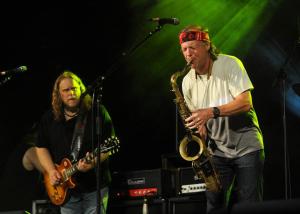 Do you regret discovering rock music quite late in your career?
Do you regret discovering rock music quite late in your career?
No, because in order to play jazz at the highest level you have to put in 100% of your time. I mean, I had to spend all my time when I was 12, 13, 14, 15, 16, 17, 18, 19, 20 to learn how to play jazz music at the highest level. If I didn’t, you might not even know me now. Once I got the jazz to a certain level, then I started opening up and listening to other things. But I didn’t have any room in my head to listen to anything but jazz when I was coming up playing. So, it was a very natural thing for me to realise it later on.
You have played live with Willie Nelson. How challenging was it for you to play country?
In jazz you can play any kind of music. It’s the same saxophone, the same artist, the same person you just play, whatever band or music you are playing with. But I can’t play avant-garde improvisation with Willie Nelson, it would sound terrible. So, what I tried to do was: Play improvisation that still connects with the song, so it’s always a challenge. It’s much simpler music, so you have to play simpler but you have to still do it in a hip way, if that makes sense.
Tony Williams joined Miles when he was 17 years old. Are there those kinds of opportunities nowadays?
You know, I am not sure. I’ve spent the last 30 years just doing my own band or some co-led bands. If you are just doing that, you spend all your time in your own world. So, before, when there were groups like Miles Davis, Elvin Jones, Joe Zawinul, Wayne Shorter and Chick Corea , these are bands that you can think yourself: “I wanna practice really hard, so I can get into one of these bands maybe in the future”. You had something to shoot for. Now, there aren’t so many bands that you can say: “I wanna play in that band. I wanna see if I can play in that band” for a young musician. So, what I tell young musicians today is: Some of the best bands of the future are the bands that the young musicians are gonna put together themselves. I said: “The band doesn’t necessarily have to exist now in order for it to be great in the future. Just play your instrument as well as you can, have a vision of where you want your band, your music and your career to be. Concentrate on that and let the universe put you in the right place”. That’s what I think. If you play your instrument really-really great when you are coming up and you are practicing enough and you are a good person, many of these future bands will find you.
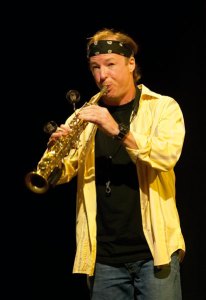 Do you have any musical ambitions left?
Do you have any musical ambitions left?
Sure, I always do. The dealings is what keeps me going (laughs). I wanna play with different players, I wanna be able to continue to write and play music with people that I haven’t played with before and people that I haven’t played with for a while. That’s why this tour coming up is with John Medeski, Felix Pastorius and Keith Carlock, because Keith and John haven’t played together and they are gonna be playing new music. It will be something fresh and different. That’s what I am interested in doing for the next 10-15 years. I mean, many of my friends have already passed away. As you get older, people die. You know now that this isn’t forever so I want to make sure that the tours you do, the people you play with are really people you wanna play with, because you don’t have a lot of time to waste.
Do you think because of the streaming services, listening to an album from start to finish is now becoming a kind of lost art?
Yes. It’s absolutely a lost art because people will go online and they will put your record on and they will listen to maybe 10 seconds of each song and maybe they ‘ll pick two or three songs to download, they won’t take the whole record. People today have a very short attention span, so they don’t listen to full song all the way through, they only download a few songs that they think they like. In the past when people bought CD’s and records, they put the record on and they listened to the whole record. But I still find people who buy CD’s on the road. I will be offering my record on the road. I will have the new CD to sell and I am always curious because I ask people: “Do you have a CD player?” and many of them say: “No” and I say: “But you are buying a CD” and they say: “I want the music to remember from tonight”. It’s interesting, if you sign it, they will buy it. It’s an interesting concept because we still sell 3.000 CD’s per tour and I’ve noticed many of them they don’t have a CD player (laughs).
A huge “THANK YOU” to Mr. Bill Evans for his time.
Official Bill Evans website: https://www.billevanssax.com/
Official Bill Evans Facebook page: https://www.facebook.com/billevanssax

